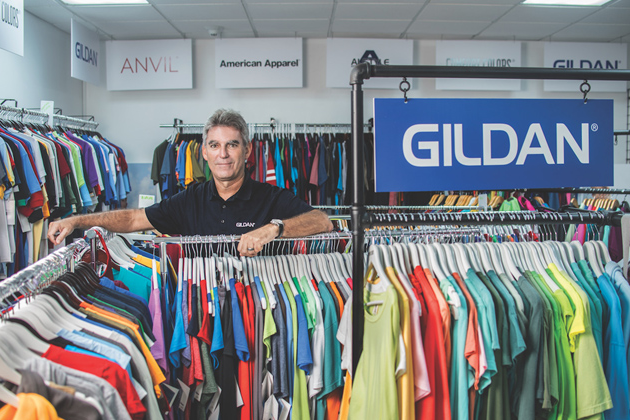

Gildan
Clothing manufacturer Gildan Activewear Inc. is pleased to announce its Next Generation ESG approach and long-term objectives for 2030, with the company aiming to reduce carbon emissions, increase the usage of “preferred fibers,” and better support workers and their communities.
The company’s strategy comprises five pillars: circularity; climate, energy, and water; human capital management; long-term value creation; and transparency and disclosure.
Glenn Chamandy, President and CEO of Gildan, said that they’ve been re-imagining and constructing the future of responsible apparel manufacturing since the outset. This has shaped Gildan into the company it is today, with the company being known for the clothes it produces and how it is produced. ESG has always been a part of their business strategy and has always been represented in their market offering. This next-generation plan will push them to achieve even better ESG results and further cement Gildan’s position as a leading ethical, sustainable, and efficient garment company.
Gildan’s new strategy is to address global environmental and social goals by enhancing the lives of people who create Gildan garments, safeguarding the environment, strengthening local communities, and boosting the sustainability of products provided to customers throughout the world.
Gildan pledges to keep fighting climate change by paving the path to a low-carbon future, with a target of decreasing scope 1 and 2 CO2 emissions by 30% by 20301, in line with the SBTi and the amount of decarbonization required to reach the Paris Agreement’s targets. To that end, Gildan is delighted to announce that it has signed the SBTi commitment letter, joining a growing number of firms around the world in taking a science-based approach to reducing carbon emissions. Gildan also pledges to address climate-change-related water-related hazards. As a result, Gildan intends to increase its investment in water efficiency and adopt further water lowering, reusing, and recycling alternatives in its operations, with the goal of achieving a 20% decrease in water use by 2030.
Gildan has pledged to promote a circular economy in order to lessen its environmental effect. Gildan hopes to improve sustainable waste management strategies by sourcing more sustainable and transparent raw materials. By 2025, the goal is to use 100 percent sustainable cotton and 30 percent recycled polyester or alternative fibers and/or yarns. By 2027, the goal is to use 30 percent recycled polyester or alternative fibers and/or yarns. By 2027, the company wants to eliminate all manufacturing waste and use 75 percent recycled or sustainable packaging and trim materials.
Gildan also pledges to continue to ensure that human rights are maintained across its supply chain. Gildan will also raise the bar on health and safety by focusing on improving employee safety and lowering workplace risks across the board. Gildan intends to achieve ISO 45001 certification at all of its Company-owned and operated facilities by 2028 in order to accomplish this.
The Company is setting the first-time target to improve gender parity in the areas of diversity, equity, and inclusion. Gildan has already achieved gender parity in manager and lower-level jobs globally, and by 2027, the company expects to achieve gender parity in director and higher-level positions.
Gildan is committed to having a positive impact on economic growth in the communities where it operates through meaningful community engagement. Gildan is to gradually expand capital allocation to purposeful and value-driven projects in the regions where it operates, eventually reaching a contribution of 1% of pre-tax earnings by 2026. In parallel, the Company will engage one of its most important stakeholders, its employees, and will continue to enable and encourage employee volunteerism at all levels in order to increase local impact.
The public sharing of the journey with stakeholders will be a significant aspect of Gildan’s accountability in meeting these goals. To that end, Gildan pledges to improve and deepen its ESG disclosure across all of its business sectors, allowing stakeholders to make better informed ESG-related decisions while retaining a high level of confidence and understanding of the company.
Gildan plans to improve its alignment to the TCFD framework in 2022 by releasing a stand-alone report that will outline the company’s climate-related governance, strategy, risk management, KPIs, and targets.
Claudia Sandoval, Vice-President of Corporate Citizenship at Gildan, said that they’re convinced that this new approach will accelerate their efforts to new heights, allowing them to become a stronger and more resilient Company. While Gildan began its ESG journey more than two decades ago, they recognize that the road to sustainability is never-ending, which is why it will continue to develop its initiatives. They also understand that setting goals aren’t enough. As a result, they’re building clear and credible roadmaps to address the difficulties and possibilities they face, and they won’t be doing it alone. All essential players must work together for its success, and they are delighted to cultivate and exploit a global, collaborative approach to achieve their objectives.
Panda Biotech has partnered with TDMI Twin Dragon to unveil a groundbreaking hemp denim collection crafted from 100% American-grown industrial…
Serge Ferrari Group has unveiled Batyline (Stam) Skin Feel, a new addition to its acclaimed upholstery collection designed for both…
Soorty, a Pakistani denim manufacturer, has announced that its Soorty Organic Cotton Initiative is now officially recognised by the Organic…
Modern Meadow has partnered with Bellroy to introduce its Innovera biomaterial, formerly known as Bio-Vera, into a new range of…
Re&Up has entered into a strategic partnership with Italian yarn spinner Marchi & Fildi to co-develop a new generation of…
Unifi has unveiled Repreve with CiClo technology, combining recycled polyester and nylon with biodegradable technology to help tackle microfibre pollution.